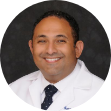What is an Upper Endoscopy (EGD)?
An upper gastrointestinal endoscopy is a procedure that allows your doctor to look at the interior lining of your esophagus, your stomach, and the first part of your small intestine (duodenum) through a thin, flexible viewing instrument called an endoscope. The tip of the endoscope is inserted through your mouth and then gently advanced down your throat into the esophagus, stomach, and duodenum (upper gastrointestinal tract). Since the entire upper gastrointestinal (GI) tract can be examined during this test, the procedure is sometimes called an esophagogastroduodenoscopy (EGD). Our NJ gastroenterologists give patients access to upper endoscopy so they can stay on top of their digestive health and live more comfortable lives.
Why is Upper Endoscopy Performed?
An upper endoscopy is an excellent way for your gastroenterologist to examine your upper digestive system and take the right next steps for your digestive health. Through the endoscope, your doctor can look for ulcers, inflammation, tumors, infection, or bleeding. The test can evaluate and determine the cause of persistent symptoms like pain, nausea, vomiting, or difficulty swallowing. Tissue samples can be collected (biopsy), polyps can be removed, and bleeding can be treated through the endoscope. Biopsy results can be checked for anemia, inflammation, and cancers of the digestive system. Endoscopy can also reveal problems that do not show up on X-ray tests, and it can sometimes eliminate the need for exploratory surgery. When necessary, special tools can be passed through the endoscope to treat problems in the digestive system. If your doctor determines that upper endoscopy is the right next step for you, they will make sure any questions you have about the procedure are answered.
How Do I Prepare for Upper Endoscopy in New Jersey?
Preparing for an upper endoscopy is not as difficult or time-consuming as preparing for other gastrointestinal procedures, but the proper steps still need to be taken so the exam can be accurate and successful. Your doctor will give you specific instructions regarding how to prepare, but in general, you should not have any solid food or dairy products after midnight the night before your procedure. You should also check with your doctor about whether or not you can continue taking your regular medications in the days leading up to your appointment. You cannot consume anything by mouth within the 4 hours before your appointment, since you will be sedated during the procedure. This means that you will need to arrange for a responsible adult (age 18 or over) to drive you home.
Procedure Prep Instructions (Spanish)
Procedure Prep InstructionsWhat Happens During Upper Endoscopy in NJ?
When you arrive for your upper endoscopy appointment, your physician will make sure that any remaining questions you have about the procedure are answered. You will be instructed to lie on the table either on your back or side. Monitors may be attached to you to make sure your breathing, blood pressure, and heart rate are adequate. At that time, you will receive Propofol medication through Intravenous (IV) to make you fall asleep. In certain rare cases, your doctor may give you a painkiller and spray an anesthetic in your mouth to numb your throat. The endoscope will then be inserted into your mouth and passed down your throat. This procedure should not cause any pain and will not affect your breathing. Since the purpose of this test is to view abnormalities in your upper digestive tract, images and/or videos will be taken to be reviewed after the procedure. Gentle air pressure may be fed into your esophagus to inflate your digestive tract. If further investigation is needed, your doctor will pass special surgical tools through the endoscope to collect tissue samples or remove a polyp. Once the examination is complete, the endoscope is slowly retracted through your mouth. The entire test takes between 5 and 20 minutes.
What Happens After Your EGD Test?
After your upper endoscopy in NJ, you will be advised to take it easy for the rest of the day. The effects of the anesthesia can persist for 24 hours. After receiving the sedation, you must exercise extreme caution before engaging in any activity that could be harmful to yourself or others (such as driving a car). Do not make any important decisions and do not drink any alcoholic beverages during this time. After your procedure, you may have anything you’d like to eat or drink (aside from alcohol), although you should start with something light. Please include plenty of fluids. Avoid items that cause gas, such as sodas and salads. You may experience some mildly uncomfortable symptoms, such as bloating, gas, cramps, and a sore throat. They will improve with time, however, if you’re concerned or have any questions, contact your doctor. You should also only take medication prescribed by your doctor. Please keep in mind that if your procedure requires the placement of a metal clip, you cannot have an MRI for 30 days.
What are the Possible Complications of Upper Endoscopy?
Although complications are very rare following an upper endoscopy, they can occur. Possible complications can include:
- Bleeding at the biopsy site (which may be minimal and rarely requires a follow up)
- A hole or tear in the gastrointestinal tract lining called perforation (this is rare, however, surgery may be required to fix this)
- Reaction to the sedatives or complications from heart or lung disease.
If you experience any of the following symptoms after your upper endoscopy, you should contact your doctor at DHC immediately:
- Fever
- Chest pain
- Shortness of breath
- Bloody, black, or very dark colored stool
- Difficulty swallowing
- Severe or persistent abdominal pain
- Vomiting, especially if your vomit is bloody or looks like coffee grounds
When Will I Receive My Upper Endoscopy Results?
Each person will receive their results differently. You may receive the findings right after the procedure, or it may take up to a week if any biopsies were sent to a lab. Be sure to ask your doctor when you should expect your results.
DHC offers patients access to upper endoscopy (EGD) procedures at our Hillsborough, NJ office and surgical center. Our physicians will answer any questions you may have about the procedure and create a care plan that is personalized to you. To make your appointment, please call 908-218-9222.
Comprehensive Gastrointestinal Care in Somerset County
At DHC, located in Hillsborough, Somerville, and Warren, NJ, our team of digestive health specialists puts each patient first. We diagnose and treat chronic and acute gastrointestinal conditions so our patients can live healthier and more comfortable lives. We will work with you to determine the cause of your symptoms and determine the best course of action for finding relief. To learn more about what we do or to schedule your appointment, please contact us today.


























